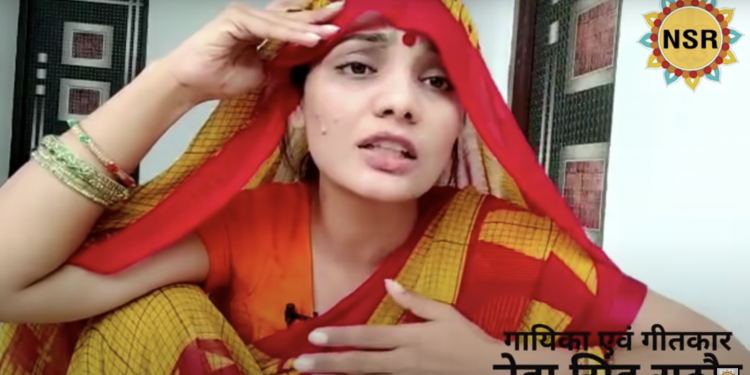A Bhojpuri folksong written and performed by a young woman from rural India recently went viral on social media, because of the clarity and courage she uses to critique the politics of Uttar Pradesh in the run-up to that state’s elections.
“U.P. mein ka ba!” sings Neha Singh Rathore, in her song about politics in India’s most populous state. “What’s in U.P.?” Within hours of uploading, her video had been watched millions of times across multiple platforms, attracted countless trolls and admirers, and prompted invitations for the young singer to appear for interviews on Hindi news networks. In an online political environment often characterised by misogyny and flooded with algorithm-driven propaganda, the authentic nature of Rathore’s performance seems to have struck a chord.
Critics of the Hindu nationalist government are increasingly labelled as anti-nationals, separatists, or terrorists. Many such critics have been imprisoned or subjected to violent attacks. Consequently, many commentators have noted this singer’s courage.
With a population of almost 200 million, Uttar Pradesh is India’s most populous state. The outcome of next month’s state legislative assembly elections will have large implications for India’s ruling BJP party and their hard-line Hindu nationalist agenda. The pandemic has restricted traditional modes of campaigning, so social media is now of unprecedented importance. The BJP has always had an advantage in this arena. A recently published two-year investigation by reporters from The Wire sheds light on how the BJP may have maintained this advantage. A web-based application named Tek Fog has apparently allowed BJP operatives to infiltrate social media platforms; harass political opponents, especially female journalists; and seize control of inactive WhatsApp accounts in order to broadcast messages en masse to the contact lists of those accounts. The Editor’s Guild of India has called the operation “misogynistic and abusive” calling it “a travesty of all democratic norms, and in violation of law.”
The surprise ability of a local singer to capture such attention in this digital ecosystem is remarkable. Rathore is a recent college graduate from a village in Bihar’s Kaimur district, on the border of eastern U.P. She sings in Bhojpuri, in a traditional style of women’s sung protest that has been performed for generations in villages in this region of north India. Bhojpuri shares enough similarities with Hindi that most Hindi speakers from other regions can understand her song. The local language and performance style adds to its authentic feel, and likely contributed to its viral nature.
Rathore’s uses satire, humour, and direct retelling of events, to launch deep criticisms of state and national leaders. The current chief minister of U.P. is Yogi Adityanath, a right-wing Hindu nationalist hardliner and protégé of Prime Minister Narendra Modi. Adityanath came to power in 2017, when Modi led the BJP to victory in the state with a historically large margin of victory. During that campaign, Modi openly inflamed communal tensions. A bizarre campaign obsession over graveyards and cremation grounds, for example, was designed to direct hatred against Muslims for their funeral practices. Adityanath himself has a history of shocking and inflammatory statements against Muslims, and his tenure as chief minister has been characterized by the same. One of his first acts as cheif minister was directing raids on Muslim business. His police force has been accused of targeting Muslim individuals. And he vowed that the state would levy sedition charges against people protesting the Islamophobic Citizenship Amendment Act passed in 2019.
Rathore’s viral performance was her response to a pro-BJP Bhojpuri song by Ravi Kishan, posted online a day earlier. Kishan is a Bhojpuri and Hindi film star and also a BJP member of parliament, from Varanasi, UP. Clad in Hindu saffron robes, and opening with an invocation to the Hindu god Shiva, Kishan sings “UP me sab ba!”—“UP has it all!” His song elaborates on a common BJP theme: the connection of the Hindu nationalist agenda to vikaas —“development.” Images of highways and airplanes are shown alongside the construction of the Ram temple in Ayodhya, UP. The BJP recently fulfilled a decades-old promise to begin construction of this Hindu temple on the site of the Babri Masjid, a 16th-century mosque that was destroyed by a Hindu mob in 1992.
Kishan’s song even makes the ridiculous claim that Yogi Adityanath has defeated COVID-19 in Uttar Pradesh.
Follow NRI Affairs on Facebook and Twitter for latest updates.
Rathore’s performance lacks the slick production of Kishan’s pro-BJP song. She is accompanied only by a percussion player who plays the dholak off screen. She sings in the folk style of her region, and—as is a common feature of women’s Bhojpuri songs—she uses her performance to critique authority with a mix of humour and satire.
For example, with a reference to the violence that took place in Lakhimpur Kheri district on 3 October 2021, Rathore criticizes the government’s violent crackdowns on the right to protest. On that day hundreds of people had gathered in response to Union Minister Ajay Mishra’s recent threats against protesting farmers in this district. Days earlier, he had declared, Agar main apne par utar aya to inhe gaon hi nahi jila bhi chorna par jayega” (If I show them my true power, they will not only have to leave their village but also the district). The threat is in line with the BJP’s increasing tendency to criminalize dissent. The imagery of ejecting protestors from their homes and district must also been seen alongside the BJP’s 2019 alteration to India’s citizenship laws—an action ladled fundamentally discriminatory by the UN human right office, and which many critics understand as threatening India’s Muslim population with statelessness.
Eight people in that protesting crowd, including a local journalist, were killed when they were rammed by an SUV belonging to the son of Ajay Mishra, the above-mentioned minister. The Editors Guild of India called this “a terror attack meant to spread fear amongst the farmers” and asked for a specific investigation into the death of the slain journalist.
Rathore’s song lays out the facts of the incident and lays the blame at the feet of the chowkidar—the village guard or watchman. In the idiom of Bhojpuri folksong, we can presume this to refer to Chief minister Yogi Adityanath or even to Prime Minister Modi himself. Both individuals, the song implies, foster the atmosphere that encourages such violence.
Mantri ke betua bade rangdar ba
kisanan ke chati pe raundat motorcar ba
ae chowkidar bola ke jimmedar ba
(The minister’s son is real powerful
He crushed those farmers with his motorcar
Hey, village guard, tell me whose responsibility is that?)
With images of bodies piling up during India’s second COVID still fresh, no one campaigning for the BJP this year is repeating the 2017 talk of graveyards and cremation grounds. During India’s second wave, many Indian students at my own university in Australia were exhausted and scared as they worked with family members back home to try and secure oxygen cylinders and medical care for sick relatives. And yet, the UP government has officially declared that there were no deaths due to lack of oxygen cylinders, and has tried to discredit the images of bodies. At the height of the crisis, Adityanath tried to criminalise accurate reporting on the situation.
In her song, Rathore reminds people of what they saw with their own eyes:
Corona se lakhan mar gayile
laasan se Ganga bhar gayile
(Corona killed hundreds of thousands
The Ganges River filled with corpses)
Rathore also critiques the actions of the UP police during the aftermath of a horrific rape and murder of a young Dalit women by a group of upper-caste men in Hathras District—including the forced cremation of her body without the family’s knowledge.
When interviewed on Hindi networks, Rathore was asked if she is scared. Many others have commented on her courage. Left unasked in these interviews is a deeper exploration of why an artist in a democratic nation should be scared to criticise her government.
The answer is in Rathore’s song itself. India’s government is increasingly othering its marginalised citizens, increasingly criminalising dissent, and increasingly using imprisonment and violence as a tool to silence critics. Indian news agencies that report accurately on the issues raised in Rathore’s song have reason now to fear criminal liability. And foreign news agencies that report on these issues are dismissed by Hindu nationalists as anti-India propaganda.
Some of Rathore’s friends have worried that she will suffer a fate like that of Gauri Lankesh, or one of India’s other writers, critics, or journalists who have been assassinated in recent years. Rathore denies any fear. Whether she is afraid or not, her performance truly is a courageous act.











